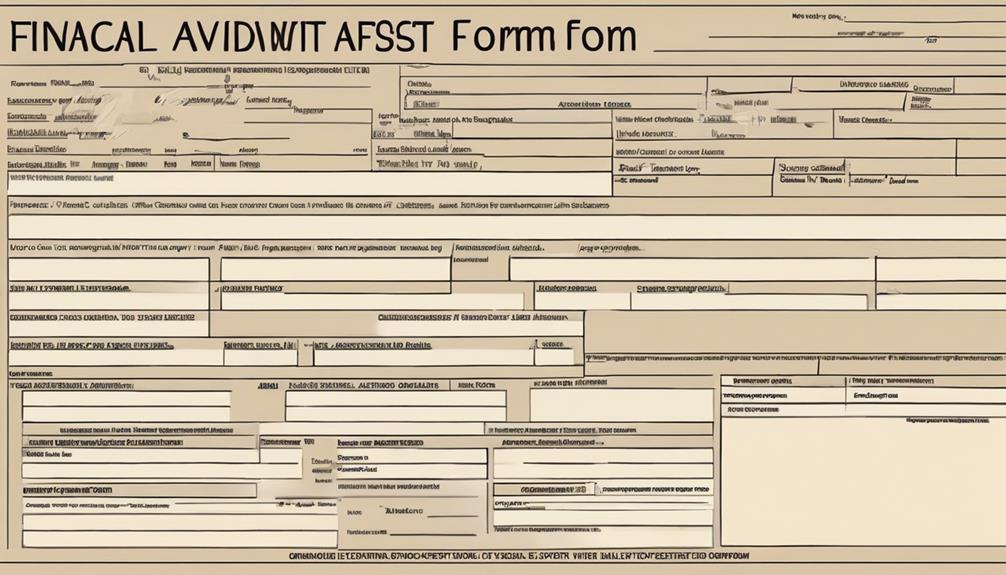As we make our way through the complex terrain of divorce proceedings, grasping the nuances of our financial affidavit is critical. It’s not merely about inputting numbers; it’s about delineating a precise financial panorama that could influence pivotal choices.
But what happens when the numbers don't add up, or a detail is overlooked? Join us as we uncover the nuances of completing your financial affidavit for divorce, where the stakes are high, and precision is key to safeguarding your financial future.
Let's embark on this journey together.
Key Takeaways
- Accurately disclose income, expenses, assets, and liabilities.
- Organize and label financial documents meticulously.
- Seek legal guidance for accurate completion.
- Transparency in the affidavit impacts divorce proceedings.
Understanding Financial Affidavits
Understanding financial affidavits is crucial for ensuring transparency and fairness in divorce proceedings.
A financial affidavit serves as a comprehensive document outlining an individual's financial status, including income, expenses, assets, and liabilities.
In divorce cases, these affidavits play a pivotal role in determining property division, child support, and alimony arrangements.
It's imperative that financial affidavits are completed accurately and honestly to avoid potential legal consequences.
Failure to disclose relevant financial information can significantly impact the outcome of divorce proceedings and may lead to disputes or delays in the resolution.
Required Financial Information

Gathering and accurately reporting all required financial information is essential when completing a financial affidavit for divorce. The affidavit must include detailed information on income, expenses, assets, and liabilities. To ensure accurate reporting, it's crucial to provide specific documents such as tax returns, pay stubs, bank statements, and loan details.
Complete financial disclosures are necessary, encompassing all sources of income like bonuses, commissions, rental income, and retirement benefits. Additionally, listing out monthly expenses, ranging from essential bills to discretionary spending, helps create a comprehensive financial overview.
Detailed information on assets such as real estate, vehicles, retirement accounts, and liabilities like loans and credit cards is vital for the affidavit. By meticulously documenting income, expenses, assets, and liabilities, individuals can provide a clear and accurate financial snapshot essential for divorce proceedings.
Organizing Your Financial Documents
To ensure a comprehensive and organized financial affidavit for divorce, it is crucial to methodically categorize and label all necessary financial documents. Gathering documents like financial statements, tax returns, pay stubs, real estate information, details on loans, and monthly bills is essential for accurate reporting and supporting financial claims. Organizing these documents will not only facilitate the completion of your financial affidavit but also ensure its completeness.
To help you effectively organize your financial documents, consider the following table:
| Category | Documents Required | Details Required |
|---|---|---|
| Financial Statements | Bank statements, investment account summaries, retirement account statements | Include all accounts from the past 12 months |
| Tax Returns | Personal and business tax returns | Ensure all schedules and attachments are included |
| Pay Stubs | Recent pay stubs from all employers | Cover the past 6-12 months |
| Real Estate Information | Property deeds, mortgage statements, home value estimates | Include any appraisals or recent sales data |
| Loans | Loan agreements, statements, repayment schedules | Detail all outstanding debts and terms |
Completing the Affidavit Form

Completing the financial affidavit form accurately and thoroughly is essential for ensuring proper property division and determining financial status during divorce proceedings. The financial affidavit requires detailed information about income, expenses, assets, and liabilities. It's crucial to ensure accuracy in filling out this form as it directly impacts the division of property and financial status determination.
Providing supporting documentation to substantiate the details disclosed in the affidavit may be necessary. Following the instructions meticulously while completing the form can help prevent errors or omissions that could affect the outcome of the divorce proceedings.
Consulting with a lawyer for guidance on accurately completing the financial affidavit is advisable to ensure compliance with legal requirements. By seeking professional advice, you can navigate the complexities of the financial affidavit with confidence and clarity.
Seeking Professional Guidance
Professional guidance from experienced lawyers specializing in divorce cases can provide invaluable insight and assistance in accurately navigating the complexities of completing your financial affidavit for divorce. Seeking professional assistance is crucial to ensure that your financial disclosures are accurate and complete, avoiding potential legal consequences. These legal experts can help you understand state-specific requirements for financial disclosures, organize your financial information effectively, and present it in a clear and compelling manner during divorce proceedings. By working with professionals in divorce cases, you can mitigate the risk of errors or omissions in your financial affidavit that could lead to complications down the line. Don't underestimate the importance of expert guidance in this process; it can make a significant difference in the outcome of your divorce case.
| Benefits of Professional Assistance | |
|---|---|
| Insight into state-specific requirements | |
| Assistance in organizing financial information | |
| Avoiding legal consequences |
Frequently Asked Questions
How Do I Fill Out an Affidavit of Financial Support?
We gather all financial documents, input precise figures for income and expenses, and seek help from a legal professional for accuracy. Completing an Affidavit of Financial Support thoroughly ensures the court understands our financial situation.
How to Fill Out a Financial Affidavit for Divorce in Connecticut?
When completing a financial affidavit for divorce in Connecticut, ensure accuracy by detailing income, expenses, assets, and liabilities. Include supporting documentation for validation. Consulting with a divorce attorney aids in navigating this crucial process effectively.
Do You Have to Fill Out a Financial Affidavit for Divorce in Florida?
Yes, we must complete a Financial Affidavit for divorce in Florida. This document details income, expenses, assets, and liabilities. Failing to submit it can result in negative legal consequences. The form's specifics vary based on income and employment status.
How to Fill Out Financial Declaration Washington State?
Wondering how to fill out a financial declaration in Washington State? It's crucial to accurately report income, expenses, assets, and liabilities. Gathering supporting documents like tax returns is essential. We'll guide you through it.
Are there specific requirements for completing a financial affidavit for divorce, and how does it differ from a financial declaration form?
When completing a financial affidavit for divorce, there are specific requirements that need to be followed. This document requires detailed financial information, including income, expenses, assets, and liabilities. It differs from a financial declaration form in that it is a more comprehensive and detailed overview of one’s financial situation. Completing a financial declaration form divorce stepbystep is essential for accurately disclosing financial information during divorce proceedings.
Conclusion
In conclusion, remember that completing your financial affidavit for divorce isn't just a formality – it's a critical step in ensuring a fair outcome.
So, go ahead and fill out those numbers, disclose those assets, and lay it all out on the table. After all, honesty is the best policy… especially when it comes to divorce proceedings.
Trust us, you'll thank yourself later.










